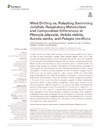Identificador persistente para citar o vincular este elemento:
https://accedacris.ulpgc.es/jspui/handle/10553/114070
| Título: | Wind Drifting vs. Pulsating Swimming Jellyfish: Respiratory Metabolism and Composition Differences in Physalis physalis, Velella velella, Aurelia aurita, and Pelagia noctiluca | Autores/as: | Bondyale-Juez, Daniel R. Romero Kutzner, Vanesa Purcell, Jennifer E. Martínez Sánchez, Ico Packard, Theodore T. Gómez Cabrera, María Milagrosa |
Clasificación UNESCO: | 240119 Zoología marina | Palabras clave: | Hydrozoa Scyphozoa Neuston Oxygen consumption ETS, et al. |
Fecha de publicación: | 2022 | Proyectos: | Estudio del Metabolismo de Medusas en aguas de Canarias | Publicación seriada: | Frontiers in Marine Science | Resumen: | Physalia physalis and Velella velella, are among the few marine organisms that harness the wind for their locomotion, whereas other cnidarian jellyfish make use of their pulsating bell-shaped bodies to propel themselves through the seas. We investigate their composition and metabolism compared with two species of pulsating scyphozoan jellyfish, Aurelia aurita and Pelagia noctiluca. Protein (P), lipid (L), carbohydrate (K), and derived energy content (Ec), provided information on the biochemical composition of these species and their relevance as prey. Physiological respiration (R) from oxygen consumption. As well as potential respiration (Φ) from the electron transport system (ETS) activity and the derived respiratory carbon demand (RCD) and heterotrophic energy transformation (HET), allow the comparison of the impact of these two types of propulsion on the metabolism, along with the impact of these organisms as predators. In this study it was found that these hydrozoans depicted a different biochemical composition relative to other gelatinous zooplankton. Lower water content at around 90% was observed, while WM-specific P, L, K, and Ec were higher, showcasing new aspects of these species as prey. The lower R/P in P. physalis and V. velella (1.8 ± 0.7 and 2.9 ± 1.1 μL O2 h–1 mg Prot–1, respectively) and the low R/Φ, around 0.1, indicate lower respiration in wind-driven propulsion compared to pulsation-driven propulsion. Additionally, these results encourage the use and research on enzymatic techniques that are particularly useful for gelatinous research, and the calculation of RCD and HET helps in understanding the physiology and role played by the organisms as predators from carbon and energy perspectives. | URI: | https://accedacris.ulpgc.es/handle/10553/114070 | ISSN: | 2296-7745 | DOI: | 10.3389/fmars.2022.817196 | Fuente: | Frontiers in Marine Science [ISSN 2296-7745], v. 9 (March 2022) |
| Colección: | Artículos |
Citas SCOPUSTM
1
actualizado el 08-jun-2025
Citas de WEB OF SCIENCETM
Citations
2
actualizado el 18-ene-2026
Visitas
56
actualizado el 10-ene-2026
Descargas
36
actualizado el 10-ene-2026
Google ScholarTM
Verifica
Altmetric
Comparte
Exporta metadatos
Los elementos en ULPGC accedaCRIS están protegidos por derechos de autor con todos los derechos reservados, a menos que se indique lo contrario.
